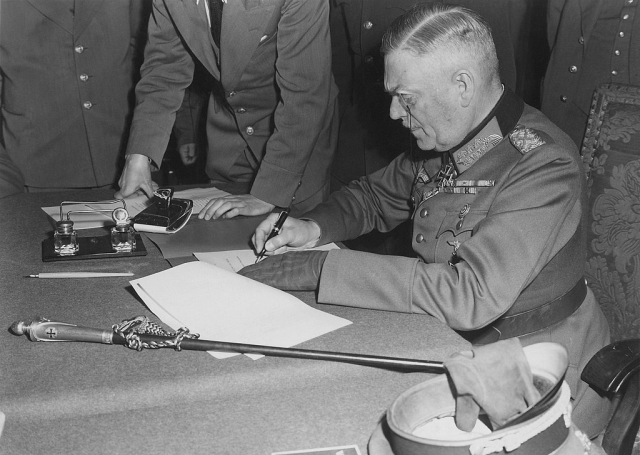
Anyone who lived through the Second World War – and we are growing fewer by the day – knows the experience of fighting a life-or-death conflict against a ruthless and vicious enemy. They canl recall how the allies, combatting the Nazi and Japanese war machines, agreed that the only acceptable outcome of the conflict would be the unconditional surrender of the enemy – a concept proposed by US President Franklin Roosevelt at the Casablanca conference in January 1943. Unconditional surrender, it was recognized, would only be achieved by fighting the enemy to a complete standstill.
Unconditional surrender is a concept unfamiliar to this generation. In the recent attempt by Israel to force the terrorist organization, Hamas, to stop firing missiles indiscriminately on defenceless Israeli civilians, the world called for a “proportionate” response. What sort of response the pundits would consider proportionate was never specified. Even when members of the Israel Defense Forces (IDF), having identified legitimate Hamas military targets, telephoned the inhabitants of buildings that housed them warning of an imminent attack, it was not enough. Israel sought no civilian deaths at all, but given the fact that the Hamas military machine was embedded within and beneath the city of Gaza, it would have been simply impossible to respond at all without running the danger of unsought civilian casualties.
Will you offer us a hand? Every gift, regardless of size, fuels our future.
Your critical contribution enables us to maintain our independence from shareholders or wealthy owners, allowing us to keep up reporting without bias. It means we can continue to make Jewish Business News available to everyone.
You can support us for as little as $1 via PayPal at office@jewishbusinessnews.com.
Thank you.
Hamas, like the Nazis, was waging what is known as “total war”. Total war makes no distinction between enemy forces and unarmed and defenceless civilians. Hitler’s opening shot in World War Two was his blitzkrieg against Poland, virtually obliterating Warsaw and scores of thousands of its inhabitants. Then he moved on to attack the civilian populations of much of western Europe. When the Nazis decided to start bombing London, on September 7, 1940, causing thousands of civilian deaths, Britain responded in kind.
By the end of the war, there was little attempt by any combatant to justify these bombing raids as strikes against military targets. Indeed the Nazis’ so-called secret weapons – the V1 and V2 rockets – were simply launched at Britain and exploded wherever they fell. The parallel with the Hamas missiles directed at Israel from Gaza is exact.
The ultimate aim of Hamas’s existence is Israel’s total elimination. Urged on by its paymaster, Iran, it seeks to conquer the Jewish state and replace it with its own regime, exactly as the Nazis sought in war-torn Europe. When Britain stood alone against the Nazis in 1940, it was fighting for its very existence. Under Iranian-inspired attacks from Gaza – or indeed from Lebanon, Syria or anywhere else – Israel is in the same position. In the circumstances Israel would seem justified in declaring as its objective the unconditional surrender of its Hamas enemy. But when the main battleground is the populated city of Gaza, and the consequent toll of civilian deaths would be totally unacceptable, unconditional surrender in a military sense is not a practical option. The question, in a 21st century context, is whether it could be achieved by other means.
Unconditional surrender implies reducing Hamas to incapacity and ineffectiveness. If achieved, it could enable Hamas and its hateful anti-Jew, anti-Judaism and anti-Israel philosophy to be eliminated from Gaza and the Palestinian body politic. It could, as with the de-Nazification operation in Germany after World War Two, make membership of the Hamas organization illegal, remove Hamas officials from all positions of public responsibility in Gaza, and restore the administration to the Palestinian Authority.
Is there a political path to this desirable end?
Lateral thinking is called for, but the vague outline of one possible strategy can be glimpsed – the frequently mentioned confederation concept. Confederation and federation are different animals. A federation is a system of government when sovereign states agree to merge their sovereignty in a joint form of administration. The USA is the supreme example. A confederation, on the other hand, is a situation when sovereign states, while retaining their sovereignty, agree to collaborate in certain defined areas of government, and set up the machinery to do so. The EU is a prime instance.
A new Israel-Palestinian peace initiative, building on the aspirations motivating the Abraham Accords, might be the way in. Talks, brokered perhaps by the Middle East Quartet (the UN, the EU, the US and Russia), might aim at a deal incorporating copper-bottom guarantees of security for Israel, the absorption of the Gaza Strip into a sovereign Palestine, and a strengthening of the Jordan-Israel peace treaty.
The mechanism for achieving a deal that would stick might be a Jordan-Israel-Palestine confederation, coming into legal existence simultaneously with a new sovereign Palestine. The confederation would be dedicated to the defense of the region as a whole, and the IDF would act in concert with the defense forces of the other parties to guarantee it. Jerusalem’s outstanding political and religious issues, as many others, would be much easier to handle within a confederation context.
From the moment it came into legal existence, the confederation could make it clear that armed opposition would not be tolerated, whatever source it might emanate from including Hamas. It would be crushed by the integrated military forces of the confederation. With Gaza incorporated within the new state of Palestine and its status guaranteed by the confederation, Hamas’s guns might be spiked permanently.
In this 21st century Middle East of ours, the World War Two definition of unconditional surrender needs to be expanded to encompass a somewhat more sophisticated interpretation.

Neville Teller is Middle East correspondent for Eurasia Review. His latest book is: “Trump and the Holy Land: 2016-2020”. He blogs at www.a-mid-east-journal.blogspot.com.
He was made an MBE – The Most Excellent Order of the British Empire in 2006 “for services to broadcasting and to drama.”
Read more articles from Neville Teller:
Hamas: Why Now?



